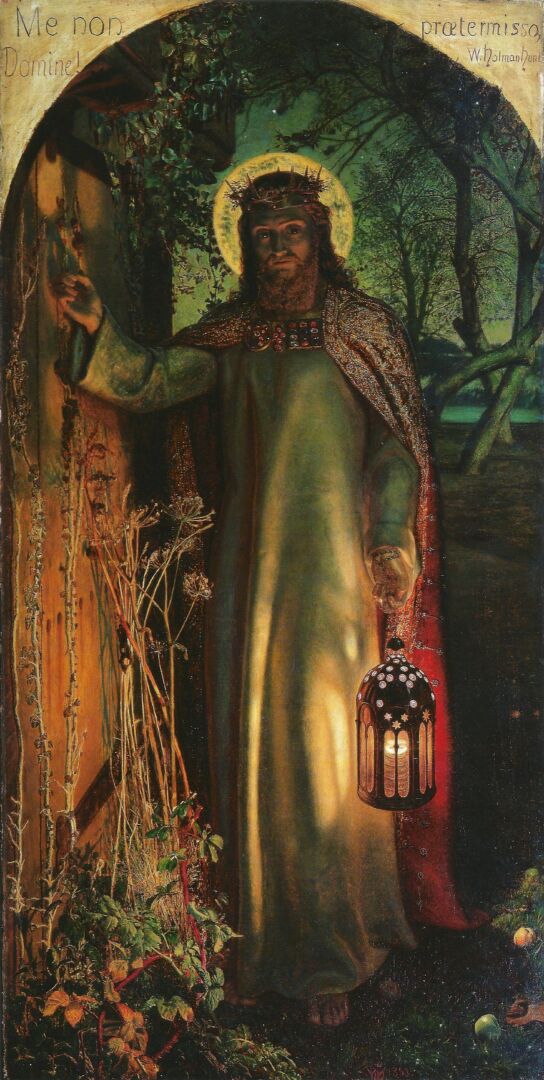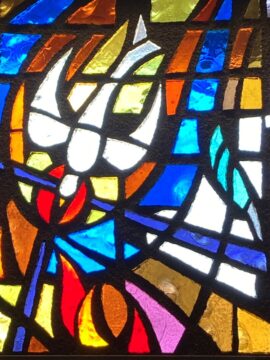Franciscan Friar Fr. Paul Gallagher reflects on the Gospel text for the Fourth Sunday of Lent. Do you know people who seem more prone than others to wrestle with questions of life and faith in God?
The content is edited by Franciscan Sister of Christian Charity Sister Anne Marie Lom and Joe Thiel. The excerpts from the Sunday readings are prepared by Joe Thiel. To read or download the complete pdf with excerpts for your prayer, please click here Franciscan Gospel Reflection March 10 2024. Excerpts are from the Lectionary for Mass for Use in the Dioceses of the United States of America, second typical edition © 2001, 1998, 1997, 1986, 1970 Confraternity of Christian Doctrine, Inc., Washington, DC. Used with permission. All rights reserved. No portion of this text may be reproduced by any means without permission in writing from the copyright owner. Photo: William Holman Hunt, Public domain, via Wikimedia Commons.
John 3:14-21
Jesus said to Nicodemus: Just as Moses lifted up the serpent in the desert, so must the Son of Man be lifted up, so that everyone who believes in him may have eternal life.
For God so loved the world that he gave his only Son, so that everyone who believes in him might not perish but might have eternal life. For God did not send his Son into the world to condemn the world, but that the world might be saved through him.
Whoever believes in him will not be condemned, but whoever does not believe has already been condemned, because he has not believed in the name of the only Son of God.
And this is the verdict, that the light came into the world, but people preferred darkness to light, because their works were evil. For everyone who does wicked things hates the light and does not come toward the light, so that his works might not be exposed. But whoever lives the truth comes to the light, so that his works may be clearly seen as done in God.
Background:
The Gospel for this Sunday is part of a dialogue between Jesus and Nicodemus. (It might be helpful to read the entire dialogue between Jesus and Nicodemus, John 3:1-21) John uses a familiar theme in his Gospel of light and darkness to describe Jesus’ presence in the world and those who reject Jesus.
The dialogue begins when “a certain Pharisee named Nicodemus, a member of the Jewish Sanhedrin, came to Jesus at night. ‘Rabbi,’ he said, ‘we know you are a teacher come from God, for no man can perform signs and wonders such as you perform unless God is with him.’” (John 3:1-2) Jesus states that “no one can see the kingdom of God without being born from above.” (John 3:3) Nicodemus responds by asking Jesus three questions and then Jesus asks two more. Jesus’ responses form a dialogue that concludes in verse 21. The first statement reassures Nicodemus that no one can be part of the reign of God unless they are begotten from above. It is possible that Nicodemus’ confusion has been caused by a word that can either mean “again” or “from above.” In the second, Jesus tells him that one must be begotten of water and the Holy Spirit to enter the Kingdom of God. The third statement is the text for this Sunday, which deals with why the Son of Man had to be “lifted up.”
In Jesus’ response to Nicodemus he draws on the familiar story of Moses in the desert to explain how one can be begotten of the Spirit. Jesus likens himself lifted on the cross to the bronze serpent Moses used in the desert. The Lord told Moses to mount a bronze serpent on a pole that was lifted so those bitten by poisonous serpents during their journey through the desert might live. (Numbers 21:8-9) Jesus is saying that, in a like manner, he will be lifted up on a cross, and anyone who looks on him with faith will be saved from death and will have eternal life.
Jesus implies that he is light that has come into the world to reveal God’s love for the world. But he also acknowledges that there are those who prefer the darkness. While this statement may be addressed to Nicodemus who has come to Jesus under the cover of darkness, for John it may also be true of the members of the Christian community who conceal their relationship with the community in order to avoid difficulties.
Reflection Questions:
- Have you ever hidden parts of who you are to avoid questions, embarrassment, or the judgement of others?
- Do you know people who openly let others know that they are in recovery, in a second marriage, or drawn to a person of the same sex? What happens within you when you encounter such a person?
- Do you remember having conversations that went into the night?
- Do you know people who seem more prone than others to wrestle with questions of life and faith in God?
- Are you one of those people?
- Have you ever thought God was deliberately remaining mysterious, hidden, or difficult to understand?
- What kind of God would God be, if God were easy to understand?
- Why do you think many monastic communities gather to pray in the night and at an hour before dawn? Do you think the darkness and the night have an impact on the quality of their prayer?
- Do you ever pray to God in the quiet of the night?
- Can you take some time to talk with God about your questions, about how Jesus seems to be responding to Nicodemus, or about your own desire to be in right relationship with God?




